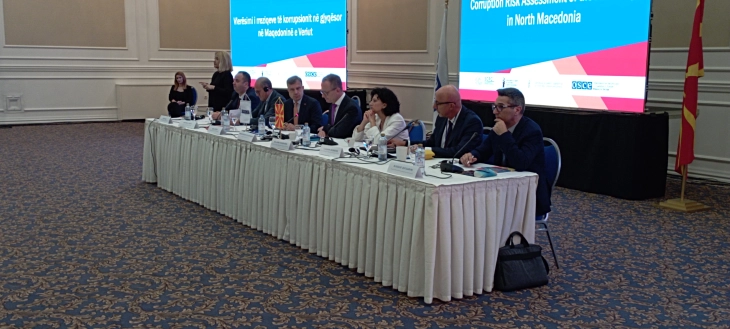Study assessing risks of corruption in judiciary presented
- The assessment of corruption risk in the judiciary shows us the experiences of judges, prosecutors, as well as the risks and vulnerability that impede justice, said the OSCE Ambassador to Skopje, Kilian Wahl, in his address in front of the judges and prosecutors at the presentation of the assessment by the State Commission for the Prevention of Corruption (SCPC), which represents a strategic document and a guideline on how to improve conditions in the judiciary.
- Post By Angel Dimoski
- 13:39, 13 June, 2023

Skopje, 13 June 2023 (MIA) – The assessment of corruption risk in the judiciary shows us the experiences of judges, prosecutors, as well as the risks and vulnerability that impede justice, said the OSCE Ambassador to Skopje, Kilian Wahl, in his address in front of the judges and prosecutors at the presentation of the assessment by the State Commission for the Prevention of Corruption (SCPC), which represents a strategic document and a guideline on how to improve conditions in the judiciary.
At the presentation, it was highlighted that the first-hand accounts and experiences of judges and prosecutors are at the heart of the corruption risk assessment in the judiciary. According to the publication, judges and prosecutors expressed doubt over the ability of the legal representatives to maintain autonomy and make independent decisions.
Ambassador Wahl, noted that the assessment explores both external and internal corruption risks, and added that it should serve as a catalyst for change, for a judiciary that upholds the principles of fairness, independence and accountability.
The Ambassador noted the importance of the inclusion of everyone in the judiciary, institutions, politicians, civil sector and the citizens in order to achieve results on this issue. He said that according to the assessment, the judges and prosecutors trust the anti-corruption measures, while the digitization in the judiciary and the automatic distribution of cases are seen positively. Ambassador Wahl added that the situation is not as we would like it to be, but that progress has been achieved according to the latest Transparency International report.
“Allegations of corruption are rampant. Anecdotes of undue influence in the justice sector are real, and they are too numerous. This is not a time for ‘business as usual’; this is a time for bold steps and action. To best direct our collective resources, let us look at what the data tells us. And let’s work together to combat corruption that exists and eliminate the risks it poses in the judiciary,” said Eric Meyer, Deputy Chief of Mission at the United States Embassy to North Macedonia.
The head of the SCPC, Biljana Ivanovska said she hopes the assessment will be used to build a healthy control system. She noted that the majority of the reports submitted by citizens to the SCPC concern judicial processes.
“The results of the assessment point to the conclusion that in conditions of an insufficiently efficient system of integrity in the judiciary, the external and internal factors and risks negatively impact the efficiency of the judiciary, but they still point to potential control systems to be established in order to reduce the identified risks,” said Ivanovska.
Judge Xhemali Saiti, President of the Association of Judges of North Macedonia, said the cooperation with the OSCE Mission to Skopje dates back several years, and has resulted in numerous activities, documents, studies and recommendations aimed to improve the situation in the judiciary.
“The assessment is part of this cooperation and I hope that it will significantly contribute to the implementation of legal mechanisms for an independent, accountable and open judiciary, as a prerequisite for raising public trust,” said Judge Saiti.
Elvin Veli, president of the Association of Public Prosecutors, said that personal integrity of public prosecutors is the most important tool for removing any influence in the proceedings.
“All judicial institutions are interconnected and efficient results can only be achieved if each of us personally invests and provides maximum effort to raise the standards and ethics in the proceedings,” Veli added.
Photo: MIA







